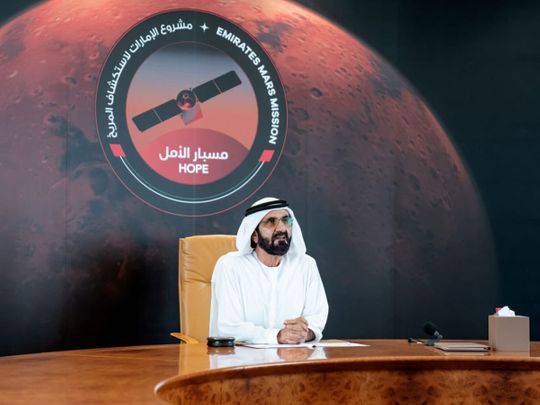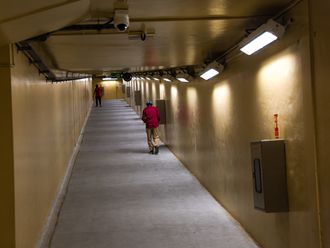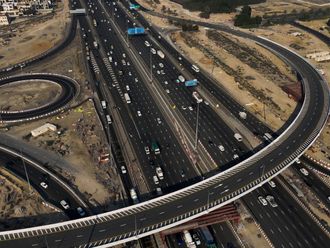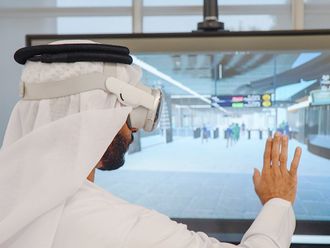
Abu Dhabi: The UAE leaders reviewed the Hope probe’s pre-flight preparations days before its historic launch to Mars from Japan’s Tanegashima Space Center in the first ever Arab interplanetary mission.
Through a video meeting, His Highness Sheikh Mohammed Bin Rashid Al Maktoum, Vice President and Prime Minister of UAE and Ruler of Dubai, His Highness Sheikh Mohammed Bin Zayed Al Nahyan, Crown Prince of Abu Dhabi and Deputy Supreme Commander of the UAE Armed Forces, and Sheikh Hamdan Bin Mohammed Bin Rashid Al Maktoum, Crown Prince of Dubai and President of the Mohammed Bin Rashid Space Center (MBRSC), were briefed on the range of technical tasks overseen by the space mission’s team.
The video meeting was held with the Emirati launch team in Japan and 21 engineers from the UAE Space Agency and MBRSC stationed at the mission control room in Dubai’s Al Khawaneej.
Addressing the launch team in Japan, Sheikh Mohammed Bin Rashid Al Maktoum said, "In 1976, the late Sheikh Zayed met NASA experts because space was his ambition. Today, you are making his dream come true."
"The young capacities and engineers who have learned and reached to this stage today is what the whole project is about."
Sheikh Mohammed Bin Rashid said, "We are proud to have our leader Mohammed Bin Zayed with us today to support you."
Sheikh Mohammed Bin Zayed conveyed regards from the President His Highness Sheikh Khalifa Bin Sultan Al Nahyan to the team in Japan and said, "We are certain that we will live up to the trust and confidence of our ancestors who established this home for us and granted us stability, prosperity and bright future."
Addressing Sheikh Mohammed Bin Rashid, he said, "Thanks to your efforts and determination, we see these young talents today bringing pride to us, their families, their country and the Arab world." He added, "This historic event would not have been possible without the devotion, determination and persistence of my brother Mohammed Bin Rashid to make this day a milestone in our lives and in the journey of our nation." He noted, "You were the main factor behind this event."
"On behalf of every Emirati, I thank my brother Mohammed Bin Rashid for making this possible."
Sheikh Mohammed Bin Zayed stressed that "today marks a milestone in the history of UAE and the Arab nation because this unprecedented achievement is for all the Arabs." He added, "the fact that this achievement was crafted by Emirati hands certainly makes it a historic day. It brings great honor to me and the people of UAE – citizens and residents. I am sure that the heart of every Emirati is with us today."
Addressing the team, Sheikh Hamdan Bin Mohammed said, "We look forward to celebrating the first transmission from the Hope probe together when it begins its journey to the Red Planet. The Mars data gathered by the probe will be a scientific discovery dedicated for the benefit of humanity."
He noted, "This achievement is from the UAE’s Mars mission team to the rest of the Arab world. It’s an invitation from the UAE to Arab youth and scientists to join us for new scientific achievements. We have entered the space era and more missions await us. We need all the innovative Arab minds on board."
The UAE leaders reviewed the final technical and logistical checks of the Hope probe, which will provide the first truly global picture of the Martian atmosphere. They listened to the plans set to manage the several launch phases before expressing their unflinching confidence in the team’s capability of effectively managing and executing the historic mission despite any rising challenges.
They praised the relentless coordination and efforts of the Emirati teams at both the launch site in Japan and the ground station in Dubai to transfer the probe on time for its initial launch amid the health and logistical challenges posed by the novel coronavirus (Covid-19) pandemic.
The mission’s launch team in Japan have completed final testing and technical checks to prepare the Hope Probe for takeoff following the multiple delays caused by the unstable weather conditions on site.
Since the probe’s arrival to the launch station in Japan in April, Emirati engineers have worked around the clock to conduct the final pre-flight checks. Dividing the responsibilities and tasks has enabled the team to work efficiently and flexibly to ensure the probe was transferred to the launch site in Japan’s Tanegashima Island on time for its initial launch. The probe was moved in an 83-hour operation of three major stages despite the challenges posed by the Coronavirus (Covid-19) pandemic.
The team at the ground station in MBRSC in Al Khawaneej are set to monitor the Hope probe’s journey to Mars from the launch to the day it enters the Red Planet’s orbit.
In the first 30 days, the team at the control room will take round-the-clock shifts to control the probe and record its first transmission. The control room will receive data once the probe is released from the rocket and the two solar panels will be deployed to charge the spacecraft’s on-board batteries.
The Hope probe’s liftoff to Mars is the outcome of a six-year journey of 200 Emirati engineers and researchers coming together to build the Arab world’s first spacecraft. Along the way, the Emirates Mars Mission helped develop 200 new science technologies and build 66 parts of the probe in the UAE.
Hope Probe: A Global Picture of Martian Atmosphere: Once it enters Mars’ orbit in the first quarter of 2021, the Hope probe will mark the UAE’s 50th anniversary. The probe will travel 493 million kilometers into space in a journey that will take seven months, and will orbit the Red Planet for one full Martian year of 687 days to provide the first truly global picture of the Martian atmosphere. The Hope probe will be the first to study the Martian climate throughout daily and seasonal cycles. It will observe the weather phenomena in Mars such as the massive famous dust storms that have been known to engulf the Red Planet, as compared to the short and localized dust storms on earth.
The Mars Hope probe will examine the interaction between the upper and lower layers of the Martian atmosphere and causes of the Red Planet’s surface corrosion, as well as study why Mars is losing its upper atmosphere.
Exploring connections between today’s Martian weather and the ancient climate of the Red Planet will give deeper insights into the past and future of Earth and the potential of life on Mars and other distant planets.
The probe will gather and send back new Mars data to the Science Data Center in the UAE via different ground stations spread around the world. The data will be catalogued and analyzed by the Emirates Mars Mission science team, and shared for free with the international Mars science community as a service to human knowledge.
The insights and data we gain from understanding the Martian climate will add new dimensions to human knowledge about how atmospheres work, which will help scientists and researchers evaluate distant worlds for conditions that might support life. Understanding the geographical and climate changes of Mars and the other planets will help us gain deeper insights to find solutions for key challenges facing mankind on earth.
The Hope Mars Mission is considered the biggest strategic and scientific national initiative announced by UAE’s President Sheikh Khalifa and Sheikh Mohammed Bin Rashid in 2014. The UAE will be the first Arab nation to embark on a space mission to the Red Planet in a journey that contribute to the international science community as a service to human knowledge.
The UAE Space Agency is funding and supervising necessary details for implementation, while the Mohammed Bin Rashid Space Center is responsible for the execution and supervision of all stages of the design, development, and the launch of the Hope probe.
From a national strategic vision, the space mission aims to build a space industry in the UAE and advance the country’s capabilities in space science and engineering. It seeks to inspire UAE’s youth to pursue advanced technologies and space science to be part of the country’s growing pool of space engineers, researchers and scientists. The space mission is part of the country’s pursuit of economic diversification and a wider vision to invest in future knowledge-based economies. The mission will cement the UAE’s status as the region’s most advanced nation in space sciences and build global space partnerships to benefit humanity and overcome key challenges facing the world.








